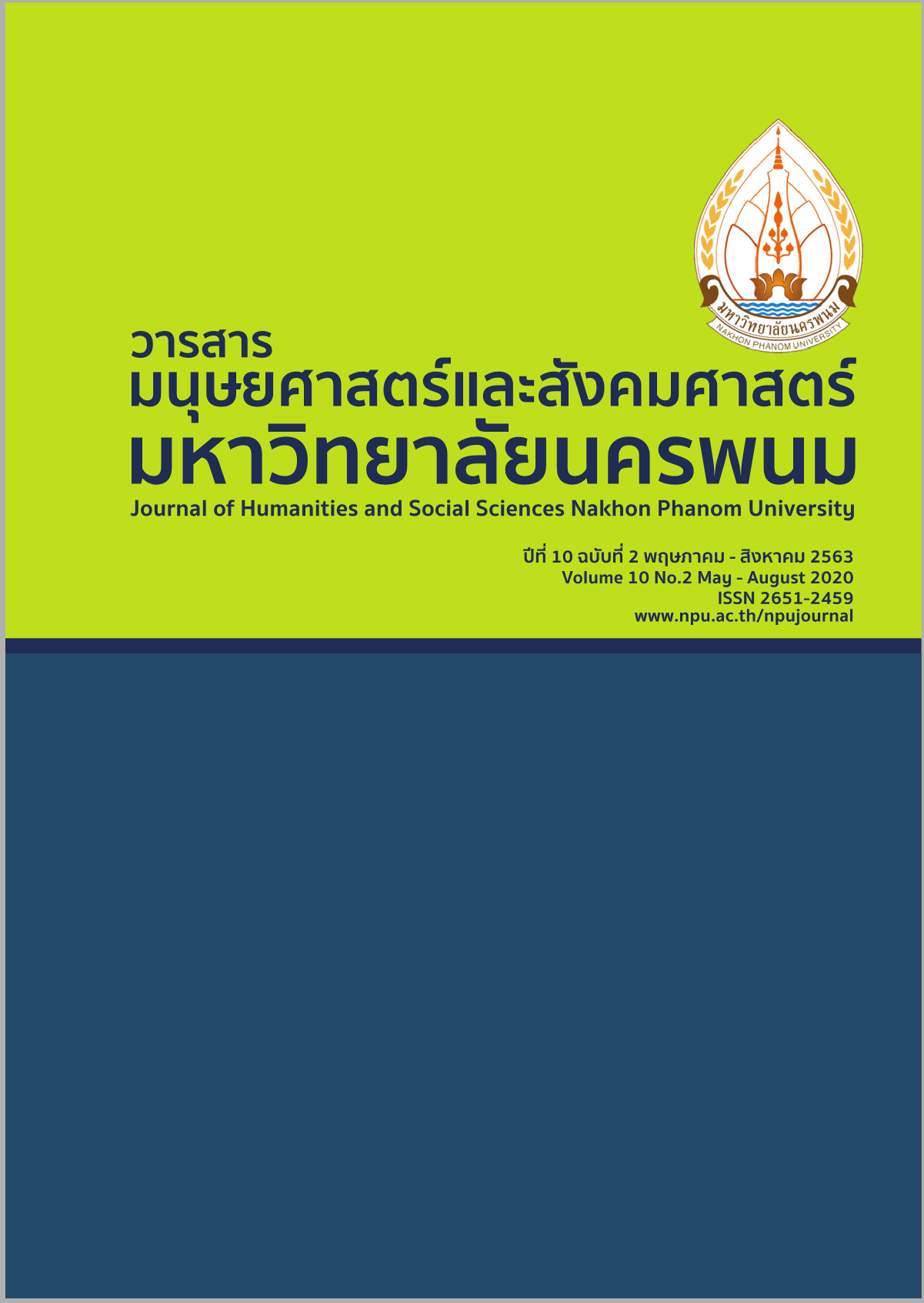Factors Related to behavior Juvenile Delinquency : Suphan Buri Juvenile and Family Court
Main Article Content
Abstract
The purposes of this study were to investigate: 1. Study of juvenile delinquency behavior Suphan Buri Juvenile and Family Court 2. Study of factors related to juvenile delinquency behavior Suphan Buri Juvenile and Family Court. The Sample is Juvenile offenders Juvenile and Family Court Suphan Buri Province. The instrument used was a questionnaire consisting of 98 people. Between the months of June – October. The average of Item-Objective Congruence Index (IOC) was 0.922 and the Reliability index was 0.815. The statistics used for data analysis were percentage, mean, standard deviation and Chi-square statistics.
The findings disclosed as follows: 1. Juvenile delinquency behavior found that most children and young people Having done 1 crime accounting for 87.8 percent. The last offense is a life and physical offense. Representing 33.7 percent. The cause of most crime is wildly challenging accounting for 57.1 percent were having a family and financial problem Accounting for 6.1 percent. And 2. Social factors and emotional factors Correlated with juvenile delinquency behavior Classified by the number of offenses.
Article Details
References
กรมสุขภาพจิต. (2543). คู่มือความฉลาดทางอารมณ์. กรุงเทพมหานคร.
กัลยา วานิชย์บัญชา. (2550). การวิเคราะห์สถิติ:สถิติสําหรับบริหารและวิจัย. พิมพ์ครั้งที่ 10.กรุงเทพฯ:โรงพิมพ์จุฬาลงกรณ์มหาวิทยาลัย.
คะนึงนิจ วิหคมาตย์. (2551). การมองตนเองในภาวะคืนสู่ครอบครัวและสังคมของเด็กและเยาวชนที่กระทำผิดซ้ำในศูนย์ฝึกและอบรมเด็กและเยาวชน. วิทยานิพนธ์. ปทุมธานี : มหาวิทยาลัยธรรมศาสตร์.
ญาณิศชา สงค์อยู่. (2559). สาเหตุและพฤติกรรมการกระทำผิดของเด็กและเยาวชน:กรณีศึกษาสาเหตุและพฤติกรรมการกระทำผิดของเด็กสก๊อย.การศึกษาค้นคว้าอิสระบริหารธุรกิจมหาบัณฑิต. ปทุมธานี : มหาวิทยาลัยรังสิต.
ณิชธร ปูรณะปัญญา. (2558). ศึกษาปัจจัยที่มีผลต่อการกระทำความผิดเกี่ยวกับยาเสพติดของเด็กและเยาวชนในจังหวัดบุรีรัมย์.การศึกษาค้นคว้าอิสระบริหารธุรกิจมหาบัณฑิต. ปทุมธานี : มหาวิทยาลัยรังสิต.
ตะวันฉาย มิตรประชา. (2557). ศึกษาปัจจัยที่มีอิทธิพลต่อการกระทำความผิดซ้ำของเยาวชนเพื่อหาแนวทางในการพัฒนาเยาวชนภายหลังการปล่อยตัว.วารสารวิชาการมหาวิทยาลัยปทุมธานี 34 ปี,ที่ 6 ฉบับที่ 1 (น.34-46).
มนต์นัทธ์ ทองสิมา. (2557). ศึกษาปัจจัยที่มีผลต่อพฤติกรรมเสี่ยงและการรณรงค์ต่อต้านพฤติกรรมการใช้ยาเสพติดของนักเรียนมัธยมศึกษาตอนต้นเขตดุสิตกรุงเทพมหานคร.วารสารวิชาการมนุษยศาสตร์และสังคมศาสตร์,ปีที่ 22,ฉบับที่ 39 (น.301-328).
วีระวัฒน์ ปันนิตามัย. (2524). ความฉลาดทางอารมณ์. พิมพ์ครั้งที่ 3. กรุงเทพหานคร
โสภา ชูพิกุลชัย และคณะ. (2547). รายงานการวิจัยครอบครัว: ปัจจัยปกป้องหรือผลักดันปัญหายาเสพติดของวัยรุ่นในเขตกรุงเทพมหานคร. กรุงเทพมหานคร : คณะกรรมการ.
อพัชชา ศิริชัย. (2554). ปัจจัยที่ส่งผลต่อการกระทำผิดซ้ำของเด็กและเยาวชน ศูนย์ฝึกและอบรมเด็กและเยาวชน กรมพินิจและคุ้มครองเด็ก. วิทยานิพนธ์. กรุงเทพมหานคร : มหาวิทยาลัยเกษตรศาสตร์.
Gottfredson and Hirschi. (1990) A General Theory of Crime. Stanford, CA : Stanford University Press.
Lin .W et al.(2014). Strain, Negative Emotions, and Juvenile Delinquency: The United States Versus Taiwan. International Journal of Offender Therapy and Comparative Criminology, DOI: 10.1177/0306624X13492656.
Mazinani .N et al. (2015). A Study of Factors Affecting Juvenile Delinquency. Biomedical & Pharmacology Journal, Vol. 8 (March Spl Edition), 25-30.
Translated Thai References
Chupikulchai, S. et al. (2004). Factors Protecting or Driving Drug Problems among Adolescents in Bangkok. Bangkok: Committee. [in Thai]
Department of Mental Health. (2000). Emotional Quotient Handbook. Bangkok. [in Thai]
Mitpracha, T. (2014). A study the problems and factors influencing recidivism of juvenile delinquents and explore the direction of youth development to prevent recidivism after their release. Pathumthani University Academic Journal, 6(1), 34 – 46. [in Thai]
Wihokmart, K. (2009). Self-Concepts in Family and Social Integration among the Recidivist at Juvenile Vocational Training Centres (Unpublished master’s thesis). Thammasat University, Pathum Thani, Thailand. [in Thai]
Panitamai, W. (1981) . Emotional Quotient (3rded.). Bangkok. [in Thai]
Purnapanya, N. (2015). Factors Affecting Juvinile Deliquency In Respect Of Drug Offence: A Case Study Of Burirum Province (Unpublished master’s Independent study). Rangsit University, Pathum Thani, Thailand. [in Thai]
Thongsima, M. (2014). Factors Affecting Risk Behavior and Campaign Against Drug Use Behavior of Secondary School, Dusit District Bangkok. Journal of Humanities And Social Sciences, 22(39), 301–328. [in Thai]
Sirichai, A. (2011). Factors Affecting Recidivism Behavior of Children and Youth at The Juvenile Vocational Training Centres,Department of Juvenile Observation and Protection (Unpublished master’s thesis). Kasetsart University, Bangkok, Thailand. [in Thai]
Songyoo, Y. (2016). Causes and Behavior Juvinile Deliquency : A Case Study Of Causes and Behavior of Offenders (SKOI) (Unpublished master’s Independent study). Rangsit University, Pathum Thani, Thailand. [in Thai]
Vanichbuncha, K. (2007) . Statistical analysis: statistics for administration and research (10thed.). Bangkok : Chulalongkorn University Printing House. [in Thai]


